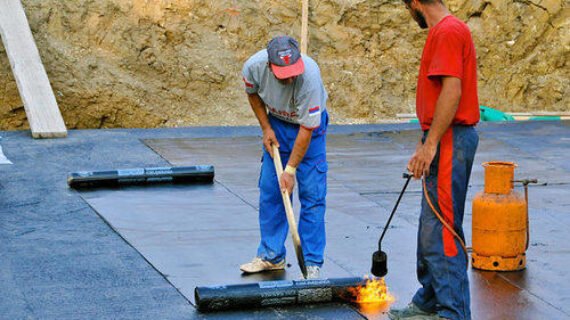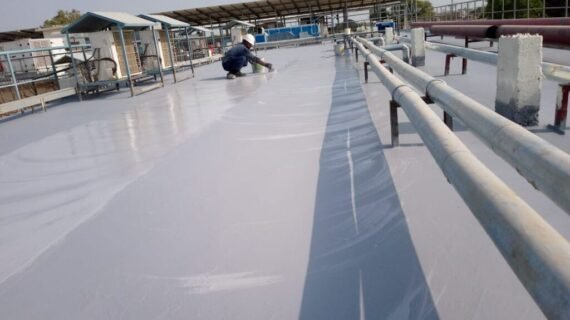Epoxy Based Bitumen
Epoxy based bitumen is a type of modified bitumen that is made by blending bitumen with epoxy resin. Bitumen is a black, sticky, semi-solid form of petroleum that is commonly used in the production of asphalt and other roofing materials. By adding epoxy resin to bitumen, the resulting material has improved properties compared to traditional bitumen.
Benefits of Epoxy Base Bitumen
Enhanced durability and resistance to various environmental factors
One of the main benefits of epoxy based bitumen is its enhanced durability and resistance to various environmental factors, such as UV radiation, extreme temperatures, and moisture. This makes it an ideal material for roofing, as well as for use in waterproofing and dampproofing applications. Additionally, epoxy base bitumen has excellent adhesion properties, which makes it easy to apply and secure to various surfaces.
Flexibility
Another benefit of epoxy base bitumen is its increase flexibility. Unlike traditional bitumen, which can become brittle and crack over time, epoxy base bitumen retains its flexibility even in extreme temperature conditions. This helps to prevent the formation of cracks and fissures, which can lead to leaks and other damage to the material.
Versatility
Another advantage of epoxy base bitumen is its versatility. It can be apply to various surfaces, including concrete, metal, and masonry, using a variety of application methods, including pouring, brushing, and rolling. This makes it a suitable material for a wide range of construction projects, regardless of the type of surface or application method require.
Long-term Durability
While epoxy base bitumen does have many advantages over traditional bitumen, it is also generally more expensive to produce and use. However, its long-term durability and performance make it a wise investment for many applications. Especially those that require materials that can withstand harsh weather and other environmental factors.
What is the production process of Epoxy Based Bitumen?
In terms of its production process, epoxy base bitumen is made by heating bitumen to a high temperature in a special mixing unit. The epoxy resin is then add to the hot bitumen, where it is thoroughly blend until it is evenly distribute throughout the material. The resulting epoxy base bitumen can then be apply to various surfaces, such as concrete, metal, and masonry, using a variety of application methods, including pouring, brushing, and rolling.
Applications of Epoxy Based Bitumen
This material offers several benefits over traditional bitumen, including improve durability, resistance to environmental factors, and enhance flexibility. Due to these properties, epoxy base bitumen has a wide range of applications in various industries.
Roofing
One of the most common applications of epoxy based bitumen is in roofing. It is use as a waterproofing and dampproofing material. It provides excellent protection against moisture, UV radiation, and extreme temperatures. In addition, it can be use to create flat roofs, pitched roofs, and other roofing systems, and its flexibility and adhesion properties. Make it easy to install and secure to various surfaces.
Construction Industry
Another common application of epoxy based bitumen is in the construction industry, where it is use as a waterproofing material for basements, retaining walls, and foundations. It is also use for waterproofing concrete surfaces, such as bridges, tunnels, and retaining walls. Moreover, it can provide long-lasting protection against moisture and other environmental factors.
Maritime Industry
Epoxy based bitumen is also widely use in the maritime industry, where it is use as a coating material for ships, boats, and other marine structures. It provides excellent protection against corrosion and abrasion. Moreover, its flexibility and resistance to extreme temperatures make it ideal for use in harsh marine environments.
Transportation Industry
In the transportation industry, epoxy based bitumen is use as a paving material for roads, highways, and airport runways. It is durable, flexible, and resistant to extreme temperatures. Which makes it ideal for use in high-traffic areas.
Finally, epoxy base bitumen is use in the energy industry, where it is use to create pipelines and tanks that are resistant to corrosion and other environmental factors. It is also use in the production of wind turbines. Where it is use as a coating material for the blades and other components to protect them from the elements.
Comparison of Epoxy based bitumen with other construction material
Compared to other construction materials, such as asphalt and concrete, epoxy based bitumen has several advantages. For example, it is more flexible than asphalt, which can become brittle and crack over time. Moreover, it is more durable than concrete, which can be subject to cracking and other forms of degradation over time. Additionally, epoxy base bitumen has excellent adhesion properties, making it easy to install and secure to various surfaces, which is not always the case with other materials.
Which one is better bitumen or epoxy base bitumen?
For heat proofing and waterproofing applications, epoxy base bitumen is generally consider to be the better option compared to traditional bitumen.
Heat resistance
Epoxy based bitumen has improve resistance to extreme temperatures compare to traditional bitumen. It retains its flexibility even in high temperature conditions, which helps to prevent cracking and other forms of degradation. This makes it a suitable material for heat proofing applications, where protection against high temperatures is critical.
Waterproofing
In terms of waterproofing, epoxy base bitumen is also a superior material compare to traditional bitumen. It has excellent resistance to moisture and is design to prevent water penetration, making it ideal for use in waterproofing applications. This is particularly important in roofing and damp proofing applications, where protection against moisture is critical.
Adhesion properties
Additionally, epoxy based bitumen has improve adhesion properties compare to traditional bitumen. This makes it easier to install and secure to various surfaces, which is not always the case with traditional bitumen. This is particularly important in construction projects, where adhesion is critical to the success of the project.
Conclusion
In conclusion, epoxy based bitumen is a modify form of bitumen that offers several benefits over traditional bitumen. Its durability, flexibility, and resistance to environmental factors make it an ideal material for roofing, waterproofing, and dampproofing applications. While it is more expensive than traditional bitumen, its long-term performance and benefits. To make it a worthwhile investment for many projects.
In addition, for heat proofing and waterproofing applications, epoxy based bitumen is generally consider to be the better option compared to traditional bitumen. Its improve resistance to extreme temperatures, excellent resistance to moisture, and improve adhesion properties. All these properties make it a suitable material for these types of applications. However, the final decision of which material to use should be base on a comprehensive assessment of the specific needs and requirements of the project.







